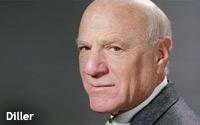 The 2nd
Circuit Court of Appeals on Tuesday refused to grant TV networks a new opportunity to argue for an injunction shutting down online video company Aereo.
The 2nd
Circuit Court of Appeals on Tuesday refused to grant TV networks a new opportunity to argue for an injunction shutting down online video company Aereo.
The decision, announced in a terse
two-paragraph order, means that Aereo can continue to operate in New York while the broadcasters' lawsuit against the start-up is pending. U.S. Circuit Judges Denny Chin and Richard Wesley dissented
from the order, with Chin criticizing Aereo's system as a “sham.”
Aereo, backed by Barry Diller, offers an $8 monthly service that streams live over-the-air TV shows to the
iPhones, iPads and other devices. The company also provides DVR-like functionality, enabling people to “record” shows and watch them later.
Last year, soon after Aereo launched in
New York, the major TV broadcasters filed a copyright lawsuit against the company in federal court. The TV networks say that Aereo infringes copyright by retransmitting programs without a license.
advertisement
advertisement
Aereo argues its system is legal due to its architecture, which uses thousands of tiny antennas to capture and stream over-the-air broadcasts. Aereo says it has the same legal rights as consumers
to capture over-the-air signals. The networks argue that the streams are public performances, which can only be authorized by a copyright holder. But Aereo counters that its streams are private,
because they are made on an antenna-to-user basis.
Last year, U.S. District Court Judge Alison Nathan rejected the broadcasters' request for a preliminary injunction banning Aereo from
operating. A three-judge panel of the 2nd Circuit upheld that decision in
April, ruling that the start-up's system doesn't infringe the TV networks' right to publicly perform programs.
The opinions in those cases said that Aereo's technology does not appear to
infringe copyright -- which is a strong indication that Aereo ultimately will prevail in federal courts in New York.
Now that the 2nd Circuit has turned down Aereo's request to rehear the
case, the networks can ask the Supreme Court to consider the matter.
Chin indicated in his dissent on Tuesday that he thinks his colleagues' pro-Aereo ruling should be overturned by a higher
court. “This decision upends settled industry expectations and established law,” he wrote. “It should not be permitted to stand.”
Even though Aereo is prevailing in New
York to date, the law governing this type of technology is unsettled. Last year, a trial judge in California has issued an injunction preventing the Aereo rival FilmOn X (previously called
Aereokiller) from operating. FilmOn X appealed to the 9th Circuit, which is considering the case.